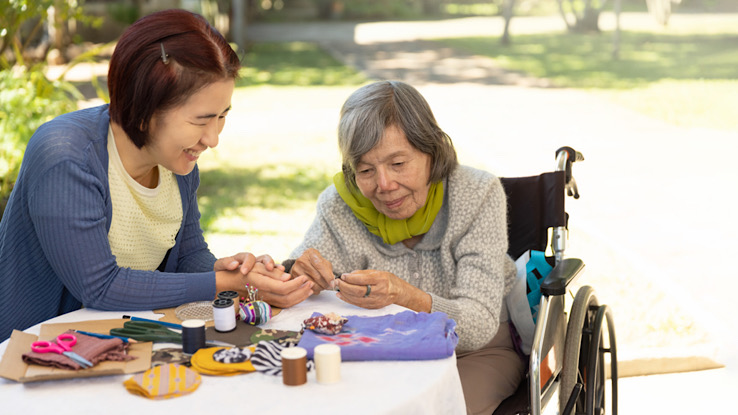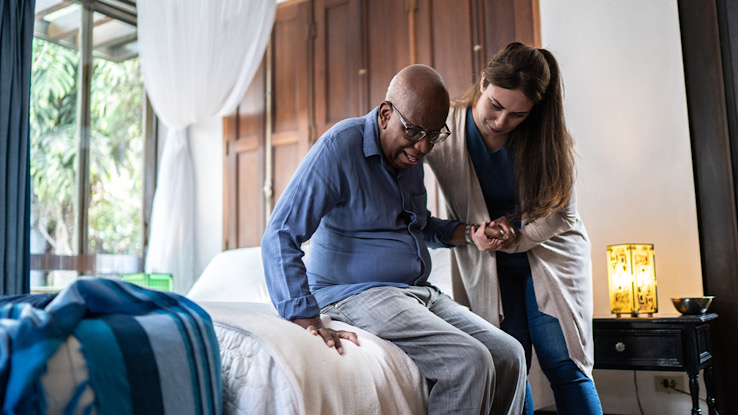
Dementia is the loss of a person’s ability to think, remember, and problem-solve. This can really affect how they live each day. There are several different types of dementia. But the exact causes are unknown.
While dementia is more common in older adults, and age is a key risk factor, dementia is not a normal part of aging. About 1 in every 3 people older than 85 have some form of dementia, but many people live full lives without ever developing dementia.
Dementia gets worse over time and it differs for each person. This makes it hard to know how long someone with dementia will live for. At this time, there are no widely available treatments to prevent, cure or slow the progression of dementia. This means that many people must learn to live with dementia and make care management plans for the future.
If you’re a caregiver, you are an important part of the care plan of someone with dementia. Find out how you can provide support for someone with late-stage dementia.
What Happens During Late-Stage Dementia?

As a person’s dementia gets worse, they will need more help. They begin to experience many changes to their health and daily life over a period of several months or years including:
- Memory loss
- Having a hard time eating, drinking, and swallowing
- Having a hard time doing personal care tasks such as dressing themselves
- Finding it hard to talk to others because they don’t understand what is being said
- Having a hard time forming sentences to speak
- Moving less or needing help to walk
- Losing weight
Your Role as a Caregiver
Your role as a caregiver is to support the person with dementia. Your goal is to help maintain a high quality of life for them. It may start to become hard to communicate because of their memory loss and loss of speech. Try finding other ways to connect through other senses like touch, sound, sight, taste and smell. This can include playing their favorite music, or brushing their hair. Think about the things they like, and try to include that throughout the day.
How to Support Decision Making
As someone experiences more memory loss, it is important to have difficult discussions early. The person with dementia may start making a plan with their family and doctors so that they are as comfortable as possible at the end of life. The discussion can feel overwhelming, but it will generally boil down to these three considerations:
- How the person would like to be cared for at the end of life including advance medical decisions.
- Where the person would like to live at the end of life. For example, they may want to stay at home or live in a facility.
- Who the person would like to care for them at the end of life. This can include family members or hiring a caregiver.
These decisions together are known as advanced care planning, and it usually requires some legal documentation. It will be helpful to get a lawyer to help make an advance directive. An advance directive can also include:
- The person’s decision to refuse a specific type of treatment, like a ventilator.
- Designating a person to make medical treatment decisions after they’re no longer able to make their own decisions.
As the caregiver, you can help support these decisions. Try to learn as much as you can about their end-of-life wishes, so you can help with conversations with doctors, family and friends if needed.
End-of-Life Care Options for Dementia

One of the main decisions that will be made is where the person will live and how they will receive the care and support they need. Sometimes, additional support is needed outside of the home to care for someone in late-stage dementia. This may mean moving the person to a facility so they can get the care they need. Options include:
- Staying at home: Most people prefer to continue living at home as they get older. This is sometimes only possible for someone with early-stage dementia. Someone from a local home-based care assistance program can provide their care. Or a family member can act as an informal caregiver.
- Residential care facility: When a person needs a lot more help with their care, they may need to consider a residential care facility. Some options are a nursing home or specialist dementia care facility. This gives them 24-hour care from trained professionals.
- Palliative care: Towards the end of life, palliative care or hospice care are options.
You can learn more about long-term care options at LongTermCare.gov and find a range of suitable care providers at Medicare.gov.
Planning Ahead Financially
Decisions regarding how and where the person with dementia would like to be cared for will also require some financial planning. The costs of medical and long-term care can be expensive. You can look into options to support their decision. There are many government programs available to help cover healthcare costs. Every program is different, so check the benefits and eligibility requirements.
Getting Support
The important thing to remember is that you are not alone. You can find information about what to expect and how best to care for someone with late-stage dementia. Try these resources:
- National Institute of Aging
- Alzheimer’s Association
- Eldercare Locator (find local services in your area)
Caregiver Health
When you’re caring for someone with late-stage dementia, you’re probably not thinking about your own health. But caring for someone with late-stage dementia can be overwhelming. You’re taking on many responsibilities, so it’s important to also take care of your health as well.
Take time to:
- See the doctor: Visit your doctor regularly (at least once a year). Be sure to talk about any changes to your stress levels, and any symptoms you are having.
- Exercise: There are so many health benefits to exercise. Try to find some time each day, even with a busy schedule. Just 10 minutes a day can help!
- Eat well: You are what you eat. Keep up with a healthy diet. You may try new recipes to change things up a bit.
- Get respite care: This is a way that you can arrange alternate care for your loved one for a few hours, days or weeks at a time. Respite care can happen in their home or at a healthcare facility. This can give you a much-needed break, or time to make more permanent arrangements.
- Join a support group: You may also benefit from finding a support group of people who are going through a similar situation.
Resource Links:
- “Alzheimer’s Disease and Related Dementias” via National Institute on Aging
- “How to know when a person with dementia is nearing the end of their life” via Alzheimer’s Society
- “End-of-Life Care for People With Dementia” via National Institute on Aging
- “Dementia and end of life planning” via NHS
- “Legal and Financial Planning for People with Dementia” via National Institute on Aging
- “Caregiver Health” via Alzheimer’s Association





